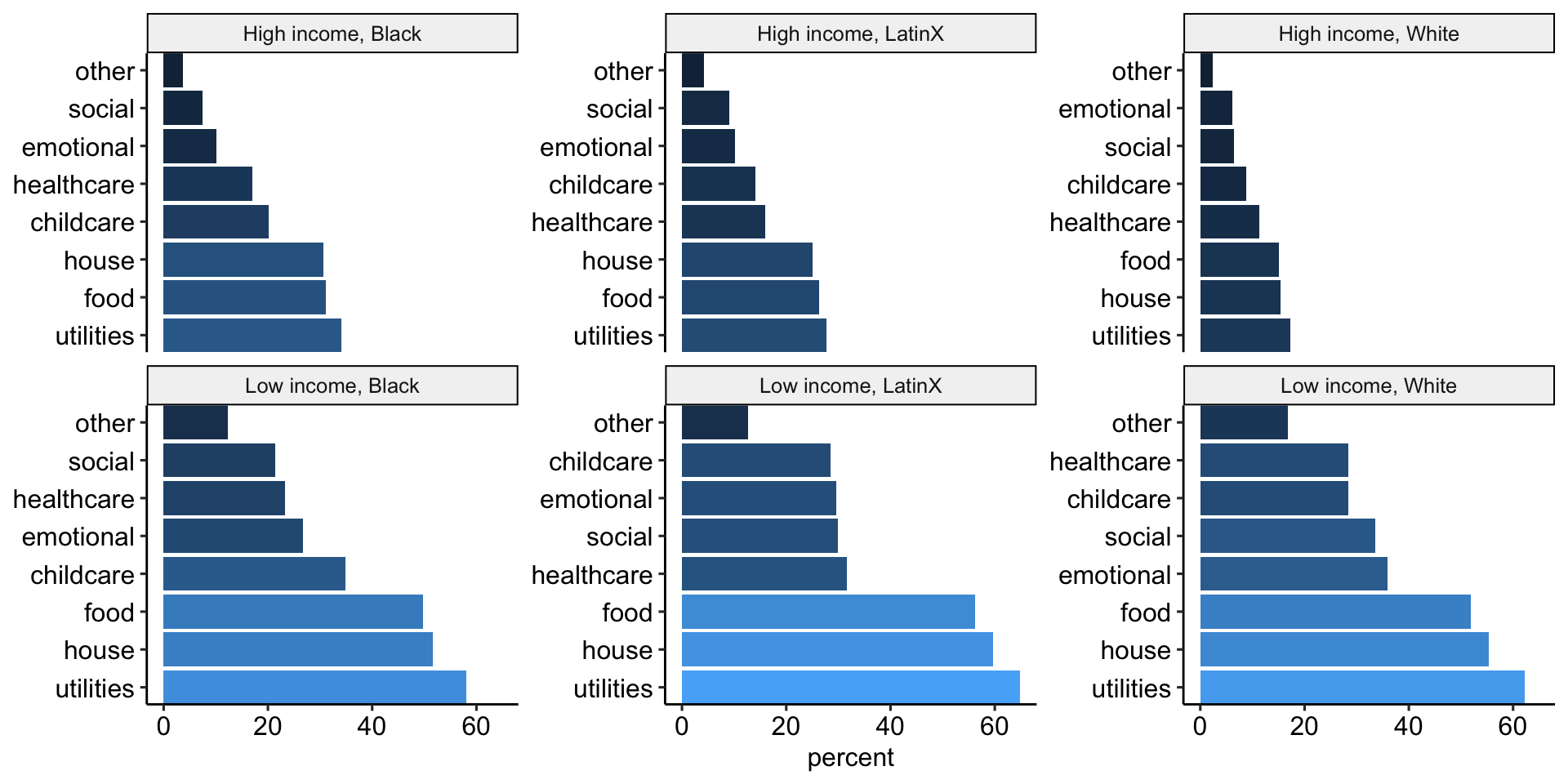- Representativeness disclaimer
- Material hardship
- Sources of material hardship
- Child Care
- Caregiver mental health problems
- Child Care
- Child mental health problems
- Child Care
evaulating effect of policies
Representativeness disclaimer
These analyses are based on responses collected from 8867 caregivers between the dates of March 01, 2020 and December 01, 2020. These caregivers represent a range of voices: 8.70% are Black/African American, 16.61% are LatinX, and 29.25% live at or below 1.5 times the federal poverty line. Proportions/percentages are calculated based on the item-level response rates, not out of the total sample size. The data for these analyses are not weighted.
Material hardship
Which needs are hard to pay for?: - Food - Housing - Utilities (electric, water, trash) - Healthcare - Social - Emotional - Childcare - Other
Caregivers grouped into two categories: trouble paying for 1+ basic need, or no trouble paying for any.
For these analyses, data collected in even numbered weeks starting in August were merged with data in the previous week – this was due to a shift to a recruitment strategy that prioritized recruiting underrepresented communities and marginalized caregivers every other week.
Sources of material hardship

Child Care
Data come from ChildTrends. Legislation related to providing additional funding to childcare providers who offer care to children of essential workers.
Statistical tests
| term | estimate | std.error | statistic | p.value |
|---|---|---|---|---|
| (Intercept) | 0.27 | 0.01 | 30.90 | < .001 |
| No legislation | -0.01 | 0.02 | -0.81 | .419 |
| Black | 0.20 | 0.03 | 7.06 | < .001 |
| LatinX | 0.12 | 0.02 | 5.90 | < .001 |
| Low Income | 0.42 | 0.02 | 25.91 | < .001 |
| No legislation:Black | -0.10 | 0.06 | -1.65 | .099 |
| No legislation:LatinX | 0.04 | 0.05 | 0.79 | .432 |
| No legislation:Low Income | -0.02 | 0.03 | -0.78 | .433 |
| Black:Low Income | -0.25 | 0.04 | -5.61 | < .001 |
| LatinX:Low Income | -0.09 | 0.03 | -2.79 | .005 |
| No legislation:Black:Low Income | 0.17 | 0.09 | 1.88 | .060 |
| No legislation:LatinX:Low Income | -0.03 | 0.08 | -0.39 | .695 |
| term | estimate | std.error | statistic | p.value |
|---|---|---|---|---|
| (Intercept) | 0.26 | 0.01 | 34.89 | < .001 |
| Black | 0.18 | 0.03 | 7.12 | < .001 |
| LatinX | 0.13 | 0.02 | 6.76 | < .001 |
| Low Income | 0.41 | 0.01 | 29.95 | < .001 |
| Black:Low Income | -0.21 | 0.04 | -5.44 | < .001 |
| LatinX:Low Income | -0.09 | 0.03 | -3.11 | .002 |
| term | estimate | std.error | statistic | p.value |
|---|---|---|---|---|
| (Intercept) | 0.39 | 0.01 | 49.09 | < .001 |
| No legislation | 0.01 | 0.02 | 0.38 | .705 |
| Black | 0.16 | 0.02 | 6.89 | < .001 |
| LatinX | 0.13 | 0.02 | 7.59 | < .001 |
| No legislation:Black | -0.03 | 0.05 | -0.64 | .525 |
| No legislation:LatinX | 0.03 | 0.04 | 0.71 | .481 |
| term | estimate | std.error | statistic | p.value |
|---|---|---|---|---|
| (Intercept) | 0.30 | 0.01 | 39.98 | < .001 |
| No legislation | -0.03 | 0.02 | -1.77 | .077 |
| Low Income | 0.39 | 0.01 | 28.84 | < .001 |
| No legislation:Low Income | 0.00 | 0.03 | -0.09 | .928 |
Caregiver mental health problems
Caregivers report levels of anxiety, depression, loneliness and stress. All variables are POMP scored (i.e., rescaled to have a minimum value of 0 and maximum of 100) and these scores are averaged to create a single mental health composite.
Child Care
Data come from ChildTrends. Legislation related to providing additional funding to childcare providers who offer care to children of essential workers.
Child mental health problems
Caregivers report levels of child fussiness and fear. All variables are POMP scored (i.e., rescaled to have a minimum value of 0 and maximum of 100) and these scores are averaged to create a single child mental health composite.
Child Care
Data come from ChildTrends. Legislation related to providing additional funding to childcare providers who offer care to children of essential workers.